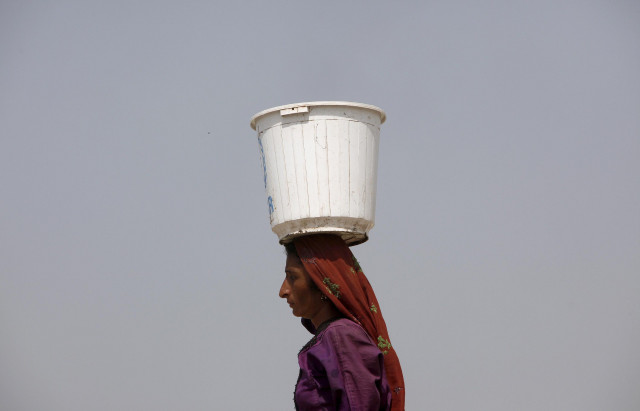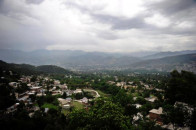‘Holy water’ gives no relief
A holy man believed to be endowed with mystical powers is frequently called upon to intone on water to purify it.

“We know the water is causing sickness but water over which holy words have been uttered cannot make us ill,” said Farkhanda Bibi (65).
Like many other flood victims in the district, Farkhanda had developed severe diarrhea but recovered. She is now anxious to keep her extended family safe, according to a report by UN information unit Integrated Regional Information Networks (IRIN).
Elsewhere in flood-affected areas of southern Punjab, people can be seen filtering water through fine, muslin cloth, convinced that this will make it safe to drink.
Though the worst of the floods in this area appear to be over, several feet of water has been left behind in most villages and is contaminating existing water sources. “I bought fine cloth to filter the water through. We know that boiling is a better option but with increasing fuel costs we can’t light stoves for the time required to boil the large quantities of water we consume in summer,” said Dawood Ahmed (50), a father of four. “Besides, we have no refrigerator, so how can we cool it? There is no ice available either,” he said.
World Health Organization (WHO) communications officer Paul Garwood told IRIN that 4.4 million people had received health care (13 per cent for acute diarrhea) between 29 July and 30 August in 2010. “Measures to respond to waterborne diseases include the establishment of diarrheal treatment centers in affected parts of the country, distribution of materials that could treat 135,000 people suffering from diarrhea and striving to address safe water, sanitation and hygiene challenges,” Garwood said.
How this is to be accomplished remains a challenge. “Chlorine tablets have been distributed to people here but many refuse to use them as they dislike the taste. Most prefer to simply try and filter water or say a few religious words over the water - either themselves or by taking the water to a local pir. “Many clerics have also perpetuated such superstitions,” said Ayaz Ali, a medical practitioner who has been seeing more and more cases of waterborne diseases over the past two months.
“The practice of saying verses over the water serves no purpose. The water has to be cleaned to prevent illness and local mosque leaders should be recruited to create awareness about this,” Mufti Muneebur Rehman, a religious scholar based in Karachi and head of the national moon-sighting committee, told IRIN.
Health officials say that animal waste and sewage has mingled with standing flood water, adding that pipes supplying the water have also been damaged in the floods and most of the water in the district is thereby contaminated. “Getting clean water is our biggest problem,” said Riaz Uddin, 40, a shopkeeper.
Various solutions have been suggested. Khurshid Bhatti, head of the Association of Human Development, a NGO based in Sindh, said, “We have developed a cheap, indigenous water filter using two clay pots which can clean up to 15 liters of water a day. No better solution exists under the circumstances.” He said the device had been in use for three years.
Atiqur Rahman, head of the Pakistan offices of the Japan-based NGO Urban Development and Environmental Research Centre has suggested using “sand or cloth to filter the water and then boiling it.”
Mumtaz Ali Memon, in charge of relief operations for the charitable al Khidmat Foundation, said that their foundation was installing hand pumps able to access groundwater in flood-affected areas, “though this does not solve the problem entirely”.
Ideal solutions are hard to come by, which explains why some are resorting to superstition. “Awareness is needed. Saying a prayer over water will not clean it. Local clerics can help educate people about this, especially in rural areas where they have a lot of influence,” Khalid Zaheer, a Lahore-based religious scholar, told IRIN.
Published in The Express Tribune, September 8th, 2010.



















COMMENTS
Comments are moderated and generally will be posted if they are on-topic and not abusive.
For more information, please see our Comments FAQ